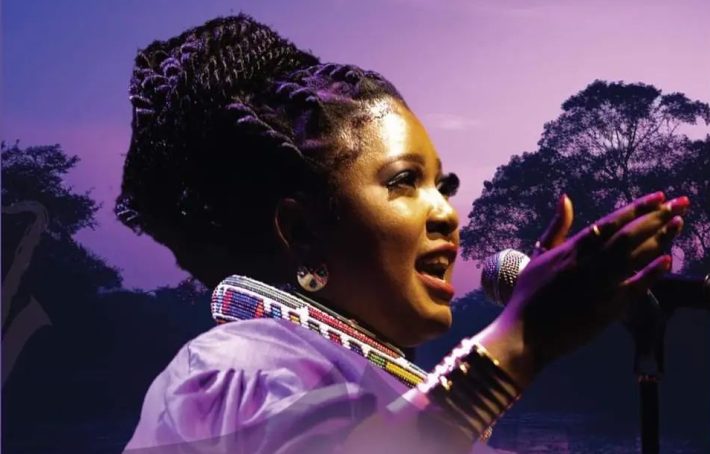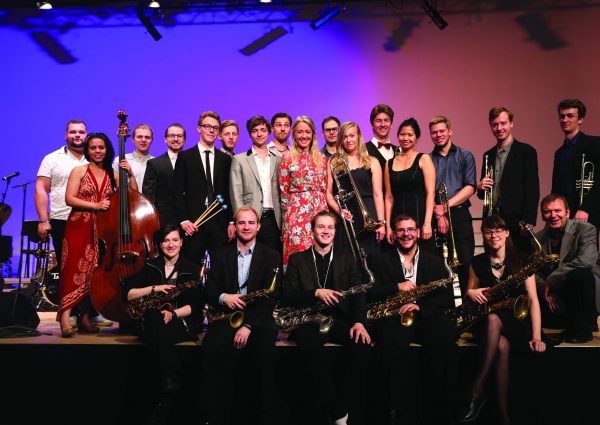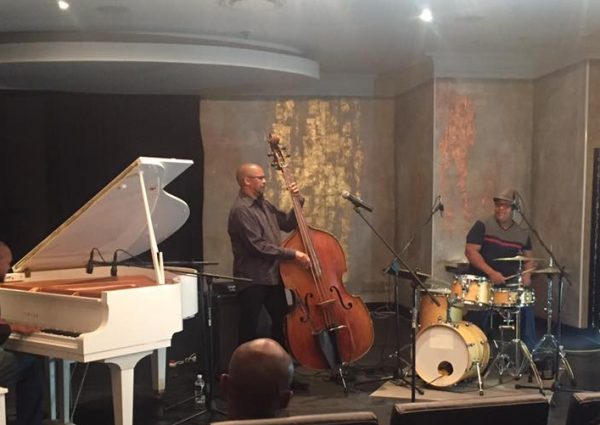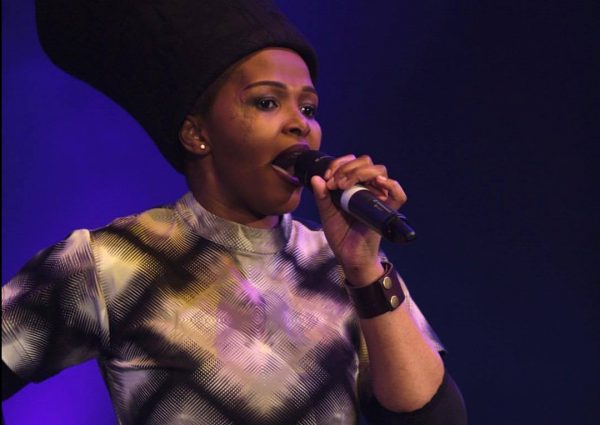Dudu Makhoba‘s Noka Namahadi offers a nostalgic vibe of the days when taverns were not just drinking holes but centres of live music and robust debates, writes Ace Moloi.
“Show e yona ke e jwang eo batho ba kenang ba le bangata tje ha e qala?” a patron who had presumably been watching other shows that flighted before Dudu Makhoba’s Noka Namahadi wonders why more people (including me) flock in when the production is about to start.
It’s the first Saturday of August, and like many institutions all over the country, Pacofs, too, has decided to stick to the Women’s Month script. The performing arts centre is staging a marathon of women-led shows – Ranavalona at 6pm, followed by the Women Can Concert for a stretch of an hour, and the crowd-pulling Noka Namahadi as the festival closer at 8pm.
Noka Namahadi offers a nostalgic vibe of the days when taverns and shebeens were not just drinking holes but centres of live music, black entertainment and wide-ranging debates about sports, politics, the law, philosophy, even music itself. It’s a contemporary take at reinventing the Sophiatowns of the past, the most solid memory of home for black people before forced removals destroyed our quality of urban life.
Set in “Dudu Makhoba’s Tavern”, Noka Namahadi is headlined by Dudu herself in the possessive demeanour of a shebeen queen: sheer charm, physical dominance and a self-sustaining voice. Dudu’s Tavern is also a picky employer, choosing only the best entertainers – six vocalists, two dancers, plus a three-piece band – to serve us good. Kinky in their moves, cheeky in song and styled like the stomp style divas of the 1950s, Dudu’s girls deliver an impressively curated African musical dish, its culinary artistry leaving us swooning under their spell. The show’s repertoire is a journey across generations, from the revolutionary sounds of Makeba that set the international community on a course to liberate black people from minority rule to the tireless Busi Mhlongo who brightened women’s visibility on stage.
Enter Dudu.
From a digital glance, the Weho Mdali singer impresses me as one of those artists you aren’t really artsy enough if you don’t know. She shares Facebook banter, mutual tags and song credits with some known-knowns of the music industry, like Siyanqoba Mthethwa who has musically directed demanding projects such as Joyous Celebration. So, as the only journalistic watchtower of the arts in the Free State, we (Art State, that is) bear the editorial yoke of seeing people like her coming.
At first, I don’t see her coming. Dudu. My eyes are fixed firmly on the curtain consecrating the altar we call stage, waiting for the veil to be torn so that I who is of a literary priesthood can truly validate what’s written about her. But Dudu doesn’t want to be seen coming; she seemingly believes more in being heard. After all, presence is not about sight but one’s sensory compatibility with their object. That is to say, those who have eyes will see.
“Ngikhumbula uMama ekhaya. Ngikhumbula inzalo yonke ekhaya. Sangedlula istimela sase Manzimtoti,” she soulfully sings as she walks down the aisle, unaccompanied, with no bandstand in the background, the stage still unveiled, just her and the people who cannot withhold the excitement in their hearts to finally witness this highly anticipated homecoming moment. Grateful as ever that this time around, the rush-hour Manzimtoti Train did not click-clack past her but brought her home.
The rest of the show is a delight, a brilliant way for Dudu’s homecoming. One gets to know more about her just through her original songs and the renditions her vocalists give us (not forgetting the excellence of her band).
The show also reminds us that African soul is not only a matter of the singer’s seductive vocabulary and sensual runs, but the depths of their spirituality as well, all of which our star for the night possesses. So, when she sings in Vuma Nhliziyo, “Inkanyezi zamazulu zahlangana emafini, zavumelana nathi,” she brings the extraterrestrial into the scheme of natural things, leaving one retorting apostolically: “Well-eh, what shall we say to these things? If stars are for us, then who can be against us?”
There are various technical and tactical attributes that make a great performer. One of them is knowing which song is good for foreplay and which one to climax with. If Dudu’s opening song presents a thematic summary of a daughter of the soil yearning for home, her last song, a popping sing-along titled Moratuwa, is a powerful statement that she was here.
Both songs are threaded by a deep missing of a person and place, but textured differently, Moratuwa being much more hopeful. When she and her team bows out and the standing ovation dissolves into shadows walking out of the theatre, Moratuwa is all everyone is singing. “Ke a o hopola, Babe. Ke a o hlolohela, Moratuwa,” the foyer, bathrooms and parking lot turn into an echo-chamber as our lips fail to rid themselves of this sticky composition.
At the foyer, as the cast poses for pictures with satisfied patrons and art enthusiasts exchange profound opinions about the production, I am here wondering how it feels like for an artist to be from, but not of. To sit and sing by the rivers of Babylon until you weep because all you yearn for is Zion (Psalm 137). To have a haunted – and haunting – home like the Free State is to many of its creative children.
Undeniably, the opportunity to play harps in Zion (home) is a nutritious replenishment for every artist. When home does not call, their eyes well up in tears, their voices choking indignantly, when foreign audiences ask them for a song they wish they could be singing back home. And when that home is the Free State, more often than not it’s a type of “Zion” that’s not worth being hung harps and wept for (rather belt at the top of your lungs in Gauteng than yearn for a platform at home).
Despite these glaring impurities, inflicted by the ignorance of the people running our cultural institutions and a local market that values artists only if the outside world celebrates them first, home in all its hurtful absurdities will always be holy ground for artists, a space so sacred being unseen by it produces a heartbreak that can only be coped with through hurting it back, by, for instance, announcing that you want nothing to do with it.
Philosopher-novelist Milan Kundera writes that nostalgia, in its raw feeling, is “the suffering caused by an unappeased yearning to return…a longing for country, for home.” Dudu, though in musical and not literary terms, concurs with Kundera on what he frames as the unmitigated pain of desiring home.
“You know when you’ve never performed in your hometown, in your province…This is my first time. So, thank you [for coming in numbers],” Dudu remarks in a voice lacerated with sorrowful joy at just how long it has taken for this moment to happen.
“I’m not gonna blame anyone.”
Ace Moloi is the founding editor of Art State, an internationally published award-winning author, radio host and freelance writer based in Bloemfontein.






